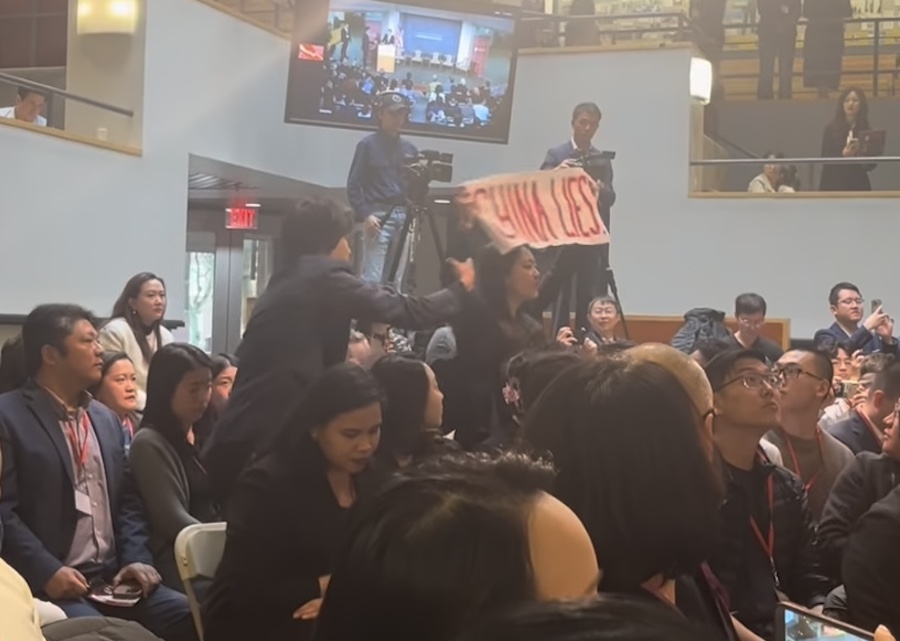By SUSAN WALKER
ENTERTAINMENT REPORTER
Half a million pilgrims came to Bodh Gaya, India in May, 2002, for a ritual invoking world peace and harmony. The Buddhist Kalachakra Initiation takes place every 12 years under the Tree of Enlightenment in this northern Indian village known as the birthplace of Buddhism.
One of the pilgrims came from northern Asia, traveling more than 5,000 kilometres while prostrating himself on the ground every few paces. It took him 3 1/2 years to get to Bodh Gaya.
German filmmaker Werner Herzog, with the help of two interpreters, includes this man’s story in Wheel Of Time, a documentary screening tomorrow at 9:30 p.m. at the Bloor Cinema in the Hot Docs festival. The film covers a procession of thousands to Tibet’s holy Mount Kailash, a section Herzog filmed himself, since he had no shooting permit. Wheel Of Time comes to a close in Graz, Austria five months later, where the final ceremonies, delayed by the illness of the Dalai Lama, were performed.
Herzog was invited by the Buddhists to make the film, but he was hesitant at first to accept. “My knowledge of Buddhism isn’t very good and I had the feeling someone else should do it,” says Herzog, on the phone from his home in Los Angeles. “But when I got there, there was so much incredible life there, so good for a camera, that I didn’t regret it for a moment.”
Wheel Of Time is poetry in motion. From the opening scenes in the teeming crowds of men (and some women) in saffron robes filing through the ancient streets of Bodh Gaya, the documentary is a symphonic and imagistic tribute to the Buddhist faith.
Herzog’s camera catches the faces of the old and the young, lingering on them until they are painterly portraits in film. The filmmaker’s quest, as laid out (slightly tongue-in-cheek) in The Minnesota Declaration, is to find the truth, not the facts. Condemning cinema verité as “devoid of verité … the truth of accountants,” Herzog makes a claim for the “poetic, ecstatic truth” that cinema can achieve.
People often make Herzog out to be rather eccentric and a little crazy (in the best way) and in his dozens of films, both dramatic and documentary, he’s been drawn to the spiritual, to madness and to eccentricity. But in conversation about this film, Herzog is almost stern.
Asked how a documentary filmmaker confirms the truth of, say, a pilgrim who’s walked 5,000 km, he’s a little outraged. “He was certainly not lying,” the director states. Only ignorant Western viewers might doubt the man. “It is simply inconceivable to you coming from a Western perspective, so you call it a lie.”
Apart from a dramatic religious phase while in adolescence, Herzog has not been a follower of organized religion. “And I wouldn’t be the one to leave his traditional culture and adopt a religion that was from a foreign culture.”
One of the most intriguing moments of Wheel Of Time occurs in an interview with the Dalai Lama, in which we can hear Herzog’s questions off-screen. In an amusing response to one question, the Dalai Lama says that, for each individual, the centre of the universe is one’s own self. “For me the centre of the universe is me, for you, the centre of the universe is you.”
“I shouldn’t tell my wife that,” we hear Herzog comment.
The filmmaker, whose dramatic features include The Enigma Of Kaspar Hauser, Aguirre, The Wrath Of God and Fitzcarraldo, says the Dalai Lama is something of a film buff and requested the interview. Herzog was duly impressed with the man, “He is very kind, generous and human, an extraordinary individual.”
Herzog, born in 1942, was raised in an isolated village in Bavaria, Germany. He didn’t use a telephone until he was 17. “I had no knowledge of the existence of cinema until I was 11.”
By the age of 14, he was creating his own film projects, but when prospective producers found out how young he was, they turned him down. While still in school, he went to work as a welder on the night shift to raise the money to make his first film when he was 19, a short called Herakles. Once he got going, Herzog was unstoppable, shooting dramas, many featuring German actor Klaus Kinski, documentaries, traveling to the remotest parts of the globe for his stories and coming home to Europe occasionally to direct an opera.
Asked whether he’d ever considered making a film about First Nations life in northern Canada, Herzog was dismissive, suggesting that it would be a story of the prevalence of alcoholism and native people wearing Ray-Ban sunglasses. But there is one place he’d like to see again: Hamilton. “There’s something very, very strange and striking about it.”









